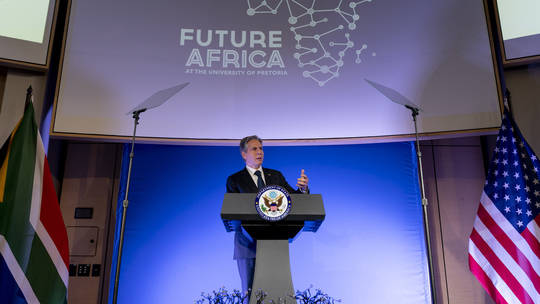The White House on Monday published its new strategy for Sub-Saharan Africa, which explicitly aims to counter China’s extensive investment on the continent and oppose Russia’s supposed “harmful activities” there.
The plan does not set out any concrete dollar amount that the US intends to spend in Africa. Rather, it outlines Washington’s broader policy aims on the continent, some of which overlap with the $600 billion ‘Partnership for Global Infrastructure’ plan announced by the leaders of the G7 countries in June.
The US says it will “foster openness and open societies” by promoting democracy and anti-corruption initiatives, “deliver democratic and security dividends” by opposing authoritarian leaders and promoting women’s and LGBT rights, “advance pandemic recovery” by delivering Covid-19 vaccines and support “climate adaptation and a just energy transition” by reducing carbon emissions and investing in the mineral extraction necessary for green energy technologies.
While the US plan is heavy on buzzwords, it is competing with a Chinese vision for Africa that Beijing says has already delivered tangible results.
Trade between China and Africa rose by 35% in 2021 to $254 billion, Bloomberg reported last week. Under its Belt and Road Initiative, Beijing has built ports, roads and other infrastructure in 43 countries in Sub-Saharan Africa.
Although the pace of this investment has slowed since the coronavirus pandemic hit in 2020, China loaned approximately $126 billion to African countries between 2001 and 2018, and spent $41 billion on foreign direct investment there, according to figures from the US-based Foreign Policy Research Institute (FPRI).
The FPRI warned that this influx of investment has made African leaders more likely to side with China in UN voting, and the US’ latest strategy echoes these concerns. Beijing “sees the region as an important arena to…advance its own narrow commercial and geopolitical interests, and weaken US relations with African peoples and governments,” the document stated.
Washington has also blamed Russia for its loss of influence in Africa. According to the strategy, Moscow “uses its security and economic ties, as well as disinformation, to undercut Africans’ principled opposition to Russia’s further invasion of Ukraine".
However, roughly half of Africa refused to support the UN General Assembly’s resolution to condemn Russia’s actions in Ukraine, and no country on the continent has so far joined the West’s sanctions.
Dependent on both Ukraine and Russia for food imports, African leaders have chosen to remain neutral, but when Ukrainian President Vladimir Zelensky addressed the African Union in June, only four of the continent’s 55 heads of state showed up to listen. Following the virtual meeting, Senegalese President and African Union Chairman Macky Sall indicated that Africa’s position of neutrality over the conflict remained unchanged.
Given this disinterest, the US will have the Pentagon reach out to Africa’s militaries. According to the strategy, the Department of Defense “will engage with African partners to expose and highlight the risks of negative [Chinese] and Russian activities in Africa.” How the Pentagon will achieve this is not explained.
Asked whether the US would punish any African countries that continue to engage with Russia, US Ambassador to the United Nations Linda Thomas-Greenfield told reporters last week that she would “caution that companies should not engage with countries that have been sanctioned by the United States".
China has held this statement up as proof that Washington’s motives in Africa are less than altruistic. An article in the state-run Global Times on Monday said that Thomas-Greenfield’s words laid “bare the US government’s coercion and hegemony.”
"Chinese enterprises have become an important force in promoting industrialization and modernization in Africa. This has led the US to re-examine the African market from a ‘competitive’ perspective,” the article read. “Bringing Africa to the path of confrontation or a new Cold War will undoubtedly lead to a disaster in the continent".
Source: RT.com



























